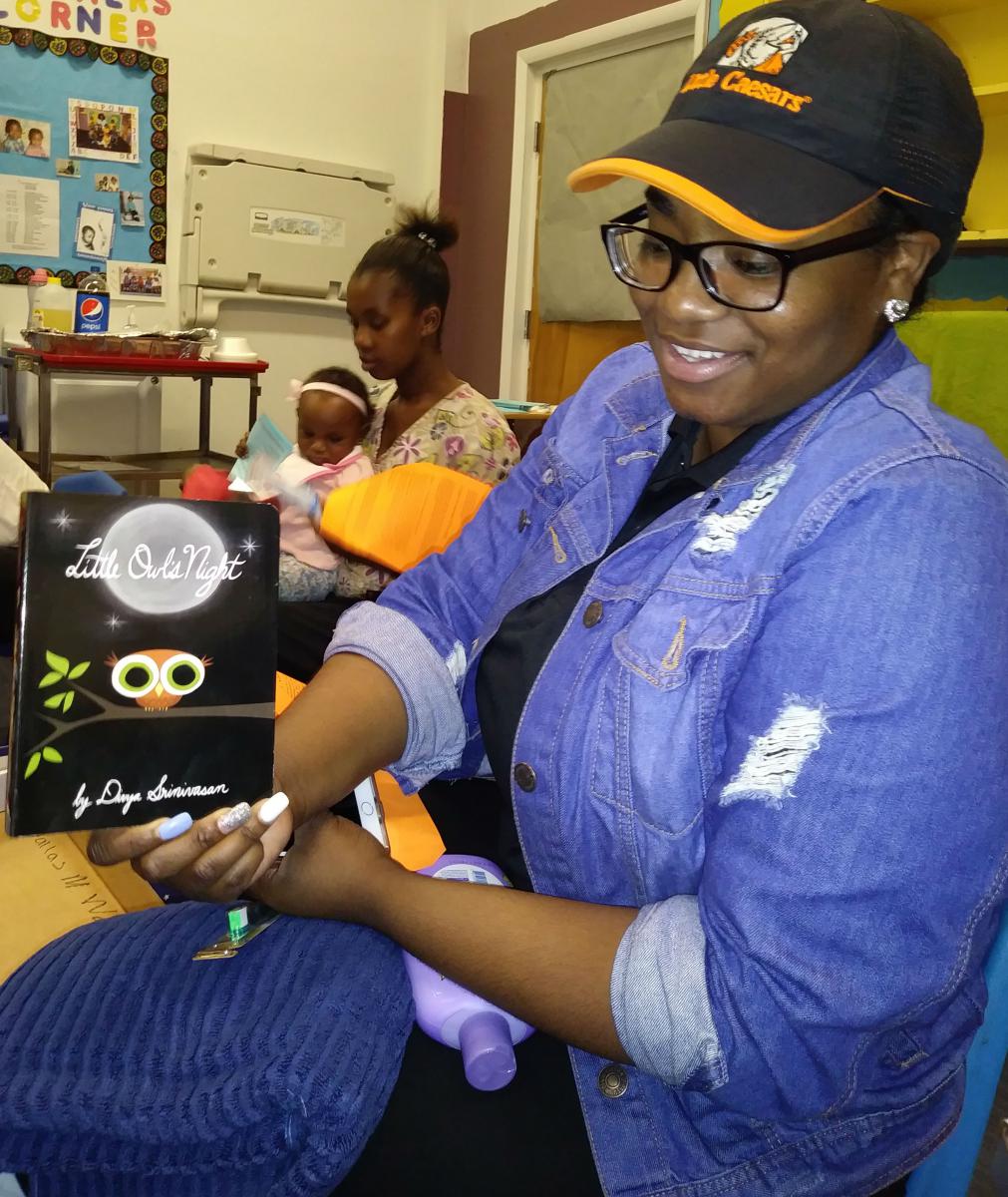The Curious Case of The Three Little Pigs Stick Puppets
By Malkia “Kia” McLeod

Family engagement “in action” can take many forms and occur in various settings such as child care facilities, schools or libraries. It can also include parents, teachers or librarians. One thing, however, is certain: family engagement requires preparation and intention. Sometimes, it means having a little faith, training the trainers and sharing the three little pigs' stick puppets.
A Little Faith
Niesha Franklin believes all parents and families want their children to succeed. As a Howard County Judy Center Family Service Coordinator, she is responsible for providing access to high-quality early .jpg) childhood programs and comprehensive family support services. This includes family well-being and an adult education component, which meet the 12 Component Standards, and Goals One and Four of the Maryland Early Childhood Family Engagement Framework.
childhood programs and comprehensive family support services. This includes family well-being and an adult education component, which meet the 12 Component Standards, and Goals One and Four of the Maryland Early Childhood Family Engagement Framework.
“I am constantly advocating for parents to utilize our community partners better,” said Franklin.
Franklin has regularly implemented several family engagement strategies, including parenting skills and health screenings. However, she experienced a barrier to family engagement after establishing a relationship with the local library to create a continued education and workforce development program.
“Unfortunately, some of my parents didn’t feel comfortable or ‘qualified’ to walk into a library,” said Franklin. “I later learned that they thought it [the library] was just for reading and checking out books.”
By keeping an open mind and gaining a better understanding of the parents Franklin serves, she could better support them. As an added benefit, she had help from Ready At Five.
Train the Trainers (Facilitators)
Franklin recognized that her parents would benefit greatly from leadership skills. Still, the question remained: how do you encourage parents to take advantage of much-needed community resources? Ready At Five offered a solution: the Parent Leadership Learning Party (PLLP) Train the Trainers training session.

“Many of the [PLLP] trainers or facilitators are from programs, like the Judy Centers, that are very aware of the importance of engaging families, but know that parents have competing priorities for their time and energy,” said Natalie Dean, Communications Director for Ready At Five.
Dean further explained that the PLLP increases parental capacity to engage in their children’s school experience and build leadership abilities. These leadership skills lend value to parents both in the context of the school community and for their personal growth. Developed in collaboration with Every Person Influences Children (EPIC), the PLLP curriculum also meets Goal Seven of the Maryland Early Childhood Family Engagement Framework: Family engagement initiatives should support the development of families as leaders and child advocates. Since September 2017, Ready At Five has trained more than 60 facilitators statewide.
The Three Little Pigs Stick Puppets
Through the PLLP, Franklin learned how to offer greater support to parents and families as they take more active roles in their children’s education, early learning programs, schools, and communities. She also discovered how visuals as simple as the three little pigs' stick puppets could be an effective tool to overcome barriers and engage families.
 “The puppets are a tool for the children and their parents to use as discussion starters that help build trust and lessen opportunities for conflict,” said Tara N. Burgess, Director of Operations and Family Engagement for EPIC. “Role-playing with puppets or toys builds vocabulary, literacy skills, and creative thinking in addition to the focus on conflict resolution.”
“The puppets are a tool for the children and their parents to use as discussion starters that help build trust and lessen opportunities for conflict,” said Tara N. Burgess, Director of Operations and Family Engagement for EPIC. “Role-playing with puppets or toys builds vocabulary, literacy skills, and creative thinking in addition to the focus on conflict resolution.”
Burgess, who also trained facilitators in states such as New York and Pennsylvania with her partner Susanna Schenk, says families often do not know how to engage in their children’s education.
“By sharing information with [families] on trust and conflict resolution, communication skills and advocacy information, and putting it all together to complete a project, families learn the value of family engagement and how to engage in meaningful ways to support their children’s success and that of other children as well,” said Burgess.
For more information about the PLLPs, Click here.
A Parent, Advocate, Teacher, and Trainer
By Malkia “Kia” McLeod
There is no “j” in family engagement. In other words, it’s a “judgment-free” community. Many members of the early childhood community are parents first. They have studied the various aspects of early childhood education and served in several leadership roles. Most importantly, they are dedicated advocates for school readiness, positive parent-child relationships and the benefits of family engagement.
“When I was in graduate school, I interned at Ready At Five,” said Brigid Cook. “Then I started working with Baltimore City Public Schools because my heart was in teaching.”
Early in her career, Cook experienced the best of both worlds: teaching for Baltimore City and implementing the Learning Party curriculum from Ready At Five. Learning Parties are interactive, hands-on parent/child events that build parents’ knowledge of school readiness skills to best support their child’s healthy growth and development. Ready At Five offers a Learning Party curriculum in seven domains of learning: Language and Literacy, Math, Science, Social Foundations, Physical Well-Being and Motor Development, Social Studies, and Fine Arts. Over the past 11 years, Cook has implemented learning parties in Language and Literacy.
“Each time they come out with a new one [Learning Party], I want to start implementing it,” said Cook. “Now I am here with one that I feel is the biggest need— especially now that I have transitioned out of the classroom.”
.jpg/pllptrainer%20(1)__247x320.jpg) For the former kindergarten teacher, the stakes had become higher. In March, Cook joined other early care and education professionals from across the state for Ready At Five’s new Parent Leadership Learning Party Train the Trainers training session. The goal of the two-day workshop is to build a cadre of local trainers who can provide sustainability for the learning parties and expand the reach to communities throughout Maryland. This will come in handy for Cook in her current role as a Title I Intervention Teacher in Baltimore City.
For the former kindergarten teacher, the stakes had become higher. In March, Cook joined other early care and education professionals from across the state for Ready At Five’s new Parent Leadership Learning Party Train the Trainers training session. The goal of the two-day workshop is to build a cadre of local trainers who can provide sustainability for the learning parties and expand the reach to communities throughout Maryland. This will come in handy for Cook in her current role as a Title I Intervention Teacher in Baltimore City.
“When I am sitting around the IEP table, I listen to the parent’s perspective, the principal’s perspective, the special educator’s perspective, and my own perspective,” said Cook. “These core topics they are talking about here just hit home for me.”
The Parent Leadership Learning Party curriculum also meets Goal Seven of the Maryland Early Childhood Family Engagement Framework: Family engagement initiatives should support the development of families as leaders and child advocates. Cook believes this particular curriculum is critical for her most important role as a parent of three children, ages five years, three years and nine months.
“It [the Parent Leadership Learning Party curriculum] will help me as a parent, and it will help me in my position partnering with parents,” said Cook. “It is going to help my colleagues as we are sitting around the IEP table or in special education trying to understand and come back to the core that parents do really care, and how can we all work together to make sure everyone is listening to the parent who will be with their child for a lifetime and work to help advocate for their child.”
Family engagement involves being intentional about partnering with parents, families, libraries, non-profits, businesses, government, and other stakeholders. It also involves leadership and advocacy at work, in the community, and at home.
“When I started this, I wasn’t a parent; but I think back to those days when I would stand in front of parents and thought I knew what I was talking about,” said Cook. “I learned a lot from working in early childhood and at Ready At Five. As a parent, I feel more connected because I live and learn it first-hand and in the trenches.”
The DRU Judy Center Promotes Family Well-Being
By Malkia "Kia" McLeod
.jpg/drujudycenterbedtime3(1)__600x439.jpg)
Although the focus was on bedtime, there were no pajamas, lullabies or nightlights at the Little Flowers Early Childhood and Development Center, Inc. in Northwest Baltimore. There were, however, a group of parents and a special stack of boxes.
“Last year, we just distributed the boxes to the parents,” said DRU Judy Center Coordinator Crystal R. Harris. “But we didn’t get any feedback from them.”
This year, Harris decided to take a more strategic approach by moving from family involvement to family engagement. In fact, she employed Goal One of the Maryland Early Childhood Family Engagement Framework: Family Engagement initiatives should promote family well-being. The first step for Harris was to identify parents' concerns and develop resources to help address them. To help parents feel more comfortable sharing, she used the recommended "Conversation Starters" to ask families about their children's daily bath or bedtime routines.
“One parent told me that her child refuses to go to bed until she does,” said Harris.
As stated in the Toolkit, when a parent expresses concerns about their child’s bedtime behaviors, a mini-assessment of the bedtime routine can help identify areas of support. The next step for Harris was to plan a four-session workshop for parents.  Hosted by the DRU Judy Center, the “Bedtime in a Box,” hour-long series highlighted age-appropriate bedtimes and helpful tips on how to get children to bed and sleep through the night.
Hosted by the DRU Judy Center, the “Bedtime in a Box,” hour-long series highlighted age-appropriate bedtimes and helpful tips on how to get children to bed and sleep through the night.
“Our goal was to stress the importance of establishing a routine, which includes preparation and at least 10-12 hours of sleep every night,” said Harris. “One of my parents thought that was too much.”
Through the workshop and “Bedtime Conversations,” Harris helped parents identify whether or not their children experienced sleep, routine, or behavioral issues. The final step for Harris was to encourage parents to establish a routine they could consistently follow in the same order every night. For additional support, she also distributed the “Bedtime in the Box” kits filled with a variety of sleepy time goodies and a routine log with stickers to track progress.
 “My son really likes the books, and he wants me to read the Little Owl Night almost every night,” said Stephanie Holmes, who has a four-year-old son enrolled in the program. “I think parents can learn a lot from this workshop, like replacing the electronics with books at bedtime.”
“My son really likes the books, and he wants me to read the Little Owl Night almost every night,” said Stephanie Holmes, who has a four-year-old son enrolled in the program. “I think parents can learn a lot from this workshop, like replacing the electronics with books at bedtime.”
The “Bedtime in the Box” kits include a bath towel, soap, foam letters and numbers, toothpaste and brush, five books, a water-resistant collapsible box, an alarm clock, a stuffed animal, an educational learning kit, and other games.


